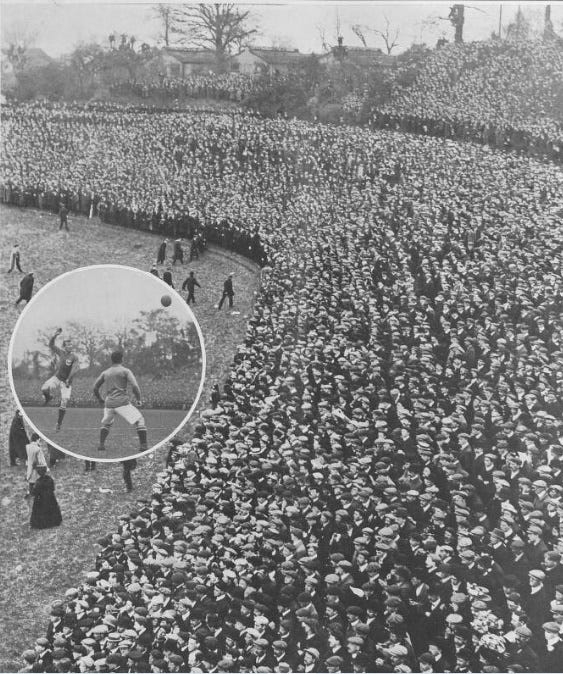When City Fell Foul of Edwardian Financial Fair Play (Pt 12)
Twelve: Winds Of Change
On 1 December 1906, City won the Manchester derby 3-0 at Hyde Road in front of a record crowd estimated at 45,000.
It was the first time the two clubs had met in the top flight. However, like many subsequent Manchester derby results, it gave little sense of the club’s relative strengths—or of things to come.
City were second from bottom before the game, two points clear of Middlesbrough (another club handed harsh sanctions by the FA six months earlier), while newly-promoted United were in 11th.
But it was the events later that day that would alter the course of Manchester’s footballing fortunes for the coming years. Immediately after the game United signed 22-year-old Sandy Turnbull, who had scored 60 goals in 119 games for City. He was one of eleven suspended players City had put up for sale that day.
United had already secured the signing of Meredith, who left on a free after the Football League upheld his claim that a benefit match he was owed meant no transfer fee should be paid. Within a few days United added 26-year-old forward Jimmy Bannister—who had scored 22 goals in 47 games for City—and City’s 23-year-old England international left back Herbert Burgess to their haul.
By the end of the week, City’s entire 1904 FA Cup-winning side had been, according to Football Chat, ‘scattered to the four winds of Heaven’.
But at least the FA now appeared to be calling an end to its campaign against City. On 4 December the Sheffield Daily Telegraph reported that, at an FA meeting in Sheffield,
‘Mr John Lewis, who at the time was in the chair, expressed the hope that the City Club had seen the end of their troubles, a sentiment which was cordially endorsed by other members of the committee.’
However, the club were about to discover the true cost of the FA’s sanctions.
City received a total of £2,725 from the sale of their suspended players, but spent £5,570 bringing in their replacements. Worse still, City’s refusal to break the rules on signing-on fees and wages meant that the best players were now shunning the club.
Following a 2-2 draw at home to Derby on 26 January, Athletic News wrote:
‘A stranger visiting the headquarters of the Manchester City club on Saturday could not fail to be struck by the depression which settled upon the spectators as the game with Derby County dragged its weary course.
The game was uninteresting and full of mistakes. It was ragged in the extreme and very few individuals gained credit for themselves.
I felt a little sorry for City. Football is not a game of trifling, and certainly the home men, or very few of them, seemed to be serious in their endeavours.’
City finished fourth from bottom in the 1906-07 season, nine places below United. The following season free-scoring United stormed to the top of the table. On 16 October 1907, Sporting Chronicle wrote:
‘The all-round ability of Manchester United is proved by their splendid goal record: 27-7, almost an average of 4-1 in their favour. No club has scored so many goals, and no club has forfeited so few. Of these 27, Alexander (“Sandy”) Turnbull has obtained nine, Meredith and Wall five each, and Bannister four.’
The fact that 18 of United’s 27 goals came from former City players was not lost on the Hyde Road faithful. To rub salt in the wound, on 12 December music hall star George Robey arranged for a charity match at Hyde Road between City’s current side and the one they’d been forced to sell.
Not surprisingly, the Manchester derby at Bank Street on 21 December was a bad-tempered affair.
United’s 3-1 win gave them a seven point lead at the top. They stayed there for the remainder of the season, winning their first League title by nine points. Turnbull was their top scorer, with 25 goals in 30 games.
The following season United won their first FA Cup. On 23 April 1909 Turnbull scored the only goal of the final. Meredith was named man of the match.
Five days later came possibly the most “Typical City” moment in the club’s history.
A 4-0 win at Anfield on 3 April had put City in 10th place, a point behind United. But after losing four of the next five games, a 1-0 defeat at Bristol City in their final game saw them relegated on goal average.
Work had already begun on United’s new 80,000-capacity Old Trafford stadium by then, securing their position as Manchester’s leading club.
Three months earlier, the sports pages of the Sheffield Daily Telegraph contained the following snippet:
It was now time for City to dig deep—and wait for the next winds of change to blow across Manchester football.
The final part of this serialization will be published on Saturday 1st June.
You can subscribe for free, below, and have it sent straight to your inbox.






And city still keep up the tradition of giving gifts to the near neighbours even now ! Excellent writing as always
Ha! And not even a thank you from them.